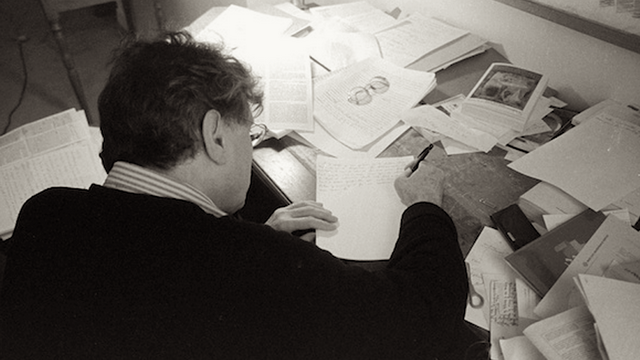“Anti-Oedipus” is famous in its difficulty, even for the most erudite reader. The seminal work by Gilles Deleuze and Felix Guattari lobbied an unrelenting assault on psychoanalysis and remains one of the key texts for anyone learning critical theory.
It only took a lengthy exposition on Judge Screber‘s anus (it’s solar) for me, personally, to determine that A) I had no idea what was going on and B) That wasn’t necessarily a bad thing.
Plenty of fun has been had with the colorful language in Deleuze and Guattari’s work – one artist decided to illustrate “A Thousand Plateaus” paragraph by paragraph, with notables including “God is a lobster.” As it turns out, the language in Felix Guattari’s diaries is equally colorful if not, for lack of a better word, insane.
In a recent Paris Review article, aptly named “Say Stupid Shit,” Dan Piepenbring finds a particularly intriguing entry from Guattari published in “The Anti-Oedipus Papers.”
“I’m strapped to this journal,” Guattari begins, “Grunt. Heave. Impression that the ship is going down.”
“You can explain everything away. I explain myself away. But to whom? You know… the question of the other. The other and time. I’m home kind of fucking around. Listening to my own words. Redundancy. Peepee poopoo.”
“Have to be accountable. Yield to arguments. What I feel like is just fucking around. Publish this diary for example. Say stupid shit. Barf out the fucking-around-o-maniacal schizo flow.”
The writing process between Deleuze and Guattari was particularly gruelling. In “Intersecting Lives,” author Francois Dosse recounts that the book was written primarily by letters exchanged by the two authors, with Deleuze setting strict guidelines for Guattari.
“This approach to writing completely upset Guattari’s daily life, because it forced him to work alone, which was not his habit,” Dosse writes. “Deleuze expected Guattari to wake up and get to his desk right away, to outline his ideas on paper (he had three ideas per minute), and, without rereading or reworking what he had written, to mail his daily draft. He imposed what he considered to be a necessary process for getting over writer’s block. Guattari followed the rules faithfully.”
Guattari was not always happy with the process. “I tell myself I can’t take the plunge and leave this shit for publication because that would inconvenience Gilles,” he writes in his diary.
“I need to stop running behind the image of Gilles and the polishedness, the perfection that he brought to the most unlikely book,” Guattari writes elsewhere. “Dare to be an asshole. It’s so hard, being strapped onto Gilles. Be stupid in my own way.”
For the full entry, check out The Paris Review.

